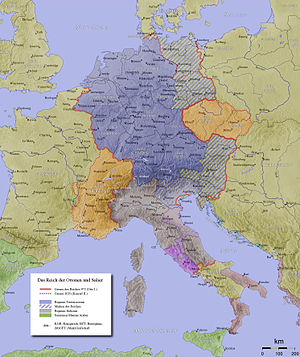This article's factual accuracy is disputed. (March 2017) |

The Kingdom of Germany or German Kingdom (Latin: regnum Teutonicorum 'kingdom of the Germans', regnum Teutonicum 'German kingdom',[1] regnum Alamanie "kingdom of Germany"[2]) was the mostly Germanic language-speaking East Frankish kingdom, which was formed by the Treaty of Verdun in 843. The king was elected, initially by the rulers of the stem duchies, who generally chose one of their own. After 962, when Otto I was crowned emperor, East Francia formed the bulk of the Holy Roman Empire, which also included the Kingdom of Italy and, after 1032, the Kingdom of Burgundy.
Like medieval England and medieval France, medieval Germany consolidated from a conglomerate of smaller tribes, nations or polities by the High Middle Ages.[3] The term rex teutonicorum ('king of the Germans') first came into use in Italy around the year 1000.[4] It was popularized by the chancery of Pope Gregory VII during the Investiture Controversy (late 11th century), perhaps as a polemical tool against Emperor Henry IV.[5] In the 12th century, in order to stress the imperial and transnational character of their office, the emperors began to employ the title rex Romanorum (king of the Romans) on their election.
The Archbishop of Mainz was ex officio arch-chancellor of Germany, as his colleagues the Archbishop of Cologne and Archbishop of Trier were, respectively, arch-chancellors of Italy and Burgundy. These titles continued in use until the end of the empire, but only the German chancery actually existed.[6]
Distinct titulature for Germany, Italy and Burgundy, which traditionally had their own courts, laws, and chanceries,[7] gradually dropped from use as the King/Emperor's influence outside of Germany waned and the German kingdom came to be identified with the Holy Roman Empire.[8]
Reigns were either dated from the day a ruler was elected king (Philip of Swabia, Rudolf of Habsburg) or crowned king (Otto IV, Henry VII, Louis IV, Charles IV). The election day became the starting date permanently with Sigismund. Throughout the Middle Ages, the King of Germany was known as "King of the Romans" from his election as king until the Pope crowned him Emperor in Rome.
- ^ The Latin expression regnum Teutonicum corresponds to German-language deutsches Reich in literal translation; however, in German usage, the term deutsches Reich is reserved for the German national state of 1871–1945, see: Matthias Springer, "Italia docet: Bemerkungen zu den Wörtern francus, theodiscus und teutonicus" in: Dieter Hägermann, Wolfgang Haubrichs, Jörg Jarnut (eds.), Akkulturation: Probleme einer germanisch-romanischen Kultursynthese in Spätantike und frühem Mittelalter, Walter de Gruyter (2013), 68–98 (73ff.).
- ^ Len Scales (2012). The Shaping of German Identity: Authority and Crisis, 1245–1414. Cambridge University Press. p. 177. ISBN 978-0-521-57333-7. Retrieved 5 April 2020.
- ^ "a conglomerate, an assemblage of a number of once separate and independent... gentes [peoples] and regna [kingdoms]." Gillingham (1991), p. 124, who also calls it "a single, indivisible political unit throughout the middle ages." He uses "medieval Germany" to mean the tenth to fifteenth centuries for the purposes of his paper. Robinson, "Pope Gregory", p. 729.
- ^ Müller-Mertens 1999, p. 265.
- ^ Robinson, "Pope Gregory", p. 729.
- ^ Whaley, Germany and the Holy Roman Empire, pp. 20–22. The titles in Latin were sacri imperii per Italiam archicancellarius, sacri imperii per Germaniam archicancellarius and sacri imperii per Galliam et regnum Arelatense archicancellarius.
- ^ Cristopher Cope, Phoenix Frustrated: the lost kingdom of Burgundy, p. 287
- ^ Cite error: The named reference
Scales2012was invoked but never defined (see the help page).